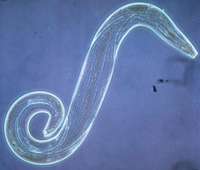Parasite
Etymology
Middle French, from Latin parasitus, from Greek parasitos, from para- + sitos grain, food
First attested in English 1539, the word parasite comes form the Medieval French parasite, from the Latin parasitus, the romanization of the Greek "παράσιτος" (parasitos), "one who eats at the table of another" and that from "παρά" (para), "beside, by" + "σῖτος" (sitos), "food". Coined in English 1611, the word parasitism comes from the Greek "παρά" (para) + "σιτισμός" (sitismos) "feeding, fattening".
- Date: 1539
Definitions
- 1 : a person who exploits the hospitality of the rich and earns welcome by flattery
- 2 : an organism living in, with, or on another organism in parasitism
- 3 : something that resembles a biological parasite in dependence on something else for existence or support without making a useful or adequate return
Synonyms
sycophant, toady, leech, sponge mean a usually obsequious flatterer or self-seeker.
Description
Parasitism is a type of symbiotic relationship between organisms of different species where one organism, the parasite, benefits at the expense of the host.
In general, parasites are much smaller than their host, show a high degree of specialization for their mode of life, and reproduce more quickly and in greater numbers than their hosts. Classic examples of parasitism include interactions between vertebrate hosts and diverse animals such as tapeworms, flukes, the Plasmodium species, and fleas. Parasitism is differentiated from parasitoidism, a relationship in which the host is always killed by the parasite such as moths, butterflies, ants, flies and others.
The harm and benefit in parasitic interactions concern the biological fitness of the organisms involved. Parasites reduce host fitness in many ways, ranging from general or specialized pathology (such as castration), impairment of secondary sex characteristics, to the modification of host behaviour. Parasites increase their fitness by exploiting hosts for food, habitat and dispersal.
Although the concept of parasitism applies unambiguously to many cases in nature, it is best considered part of a continuum of types of interactions between species, rather than an exclusive category. Particular interactions between species may satisfy some but not all parts of the definition. In many cases, it is difficult to demonstrate that the host is harmed. In others, there may be no apparent specialization on the part of the parasite, or the interaction between the organisms may be short-lived. In medicine, only eukaryotic organisms are considered parasites, with the exclusion of bacteria and viruses. Some branches of biology, however, regard members of these groups as parasitic.[1]
